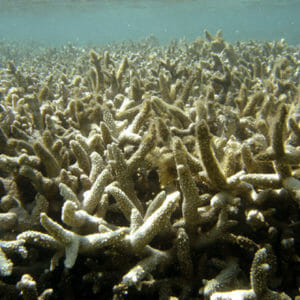ASU Center for Biodiversity Outcomes Assistant Research Professor Katie Cramer recently co-authored a paper in Ecography titled the “Millennial‐scale change in the structure of a Caribbean reef ecosystem and the role of human and natural disturbance.”
Abstract:
Caribbean coral reefs have transformed into algal‐dominated habitats over the past half‐century, but the role of specific anthropogenic drivers is unresolved due to the lack of ecosystem‐level data predating human disturbance.
To better understand the extent and causes of long‐term Caribbean reef declines, we produced a continuous 3000‐yr record of the ecosystem state of three reefs in Bocas del Toro, Caribbean Panama.
From fossils and sediments obtained from reef matrix cores, we tracked changes in reef accretion rates and the taxonomic and functional group composition of fish, coral, urchin, bivalve and benthic foraminifera. This dataset provided a comprehensive picture of reef community and environmental change.
At all sites, reefs shifted from systems with greater relative abundance of herbivorous fish, epifaunal suspension feeding bivalves and Diadema urchins to systems with greater relative abundance of micropredator fish, infaunal bivalves and Echinometra urchins
These transitions were initiated a millennium ago at two less‐degraded reefs fringing offshore islands and ~250 yr ago at a degraded patch reef near the continental coast. Ecosystem shifts were accompanied by a decline in reef accretion rates, and at the patch reef, a decline in water quality since the 18th century.
Within all cores, synchronous increases in infaunal bivalves and declines in herbivorous fish regardless of water quality suggest a loss of hard substrate and increasingly hypoxic sediment conditions related to herbivore loss.
While the early timing of ecosystem transitions at the fringing reefs implicates large‐scale hydrological change, the more recent timing of change and loss of water quality at the patch reef implicates terrigenous runoff from land‐clearing.
Our whole‐ecosystem reconstruction reveals that reef ecosystem deterioration appears to follow a predictable trajectory whether driven by natural or anthropogenic disturbances and that historical local human activities have quickly unraveled reefs at a scale similar to longer‐term natural environmental change.
